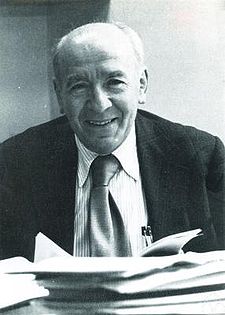- Mark Kac
-
Mark Kac 
Born August 3, 1914
Krzemieniec, Russian EmpireDied October 26, 1984 (aged 70)
California, USAResidence U.S.A. Citizenship Poland, U.S.A. Nationality Polish Fields Mathematics Institutions Cornell University
Rockefeller University
University of Southern CaliforniaAlma mater Lwów University Doctoral advisor Hugo Steinhaus Doctoral students Harry Kesten
William LeVeque
William Newcomb
Lonnie Cross
Murray Rosenblatt
Daniel StroockKnown for Feynman-Kac formula
Erdős-Kac theoremNotable awards Birkhoff Prize (1978) Mark Kac (pronounced kahts, Polish: Marek Kac, b. 3 August 1914, Krzemieniec, Russian Empire, now in Ukraine; d. 26 October 1984, California, USA) was a Polish mathematician.[1] His main interest was probability theory. His question, "Can one hear the shape of a drum?" set off research into spectral theory, with the idea of understanding the extent to which the spectrum allows one to read back the geometry. (In the end, the answer was "no", in general.)
Kac completed his Ph.D. in mathematics at the Polish University of Lwów in 1937 under the direction of Hugo Steinhaus.[2] While there, he was a member of the Lwów School of Mathematics. After receiving his degree he began to look for a position abroad, and in 1938 was granted a scholarship from the Parnas Foundation which enabled him to go work in the United States. He arrived in New York City in November, 1938.[3] With the onset of World War II, Kac was able to remain in America, while his parents and brother who remained in Poland were murdered by the Germans in the mass executions in Krzemieniec (1942-43) for being Jewish.[4] From 1939 until 1961 he was at Cornell University, first as an instructor, then from 1943 as assistant professor and from 1947 as full professor.[5] While there, he became a naturalized US citizen in 1943. In 1961 he left Cornell and went to Rockefeller University in New York City. After twenty years there, he moved to the University of Southern California where he spent the rest of his career.
Contents
Books
- Mark Kac and Stanisław Ulam: Mathematics and Logic: Retrospect and Prospects, Praeger, New York (1968) Dover paperback reprint.
- Mark Kac, Enigmas of Chance: An Autobiography, Harper and Row, New York, 1985. Sloan Foundation Series. Published posthumously with a memoriam note by Gian-Carlo Rota. Kac's distinction between an "ordinary genius" like Hans Bethe and a "magician" like Richard Feynman has been widely quoted. (Kac knew both at Cornell University.)
See also
- Feynman-Kac formula
- Erdős-Kac theorem
References
- ^ Obituary in Rochester Democrat & Chronicle, 11 November 1984
- ^ Mark Kac at the Mathematics Genealogy Project.
- ^ Mark Kac, Enigmas of Chance: An Autobiography, Harper and Row, New York, 1985. ISBN 0060154330
- ^ M Kac, Enigmas of chance : an autobiography (California, 1987)
- ^ O'Connor, John J.; Robertson, Edmund F., "Mark Kac", MacTutor History of Mathematics archive, University of St Andrews, http://www-history.mcs.st-andrews.ac.uk/Biographies/Kac.html.
External links
- O'Connor, John J.; Robertson, Edmund F., "Mark Kac", MacTutor History of Mathematics archive, University of St Andrews, http://www-history.mcs.st-andrews.ac.uk/Biographies/Kac.html.
- Mark Kac at the Mathematics Genealogy Project.
Categories:- 1914 births
- 1984 deaths
- 20th-century mathematicians
- Cornell University faculty
- Guggenheim Fellows
- Naturalized citizens of the United States
- Polish emigrants to the United States
- American mathematicians
- Presidents of the Institute of Mathematical Statistics
- Probability theorists
- Researchers in stochastics
- Polish mathematicians
- Polish Jews
Wikimedia Foundation. 2010.
